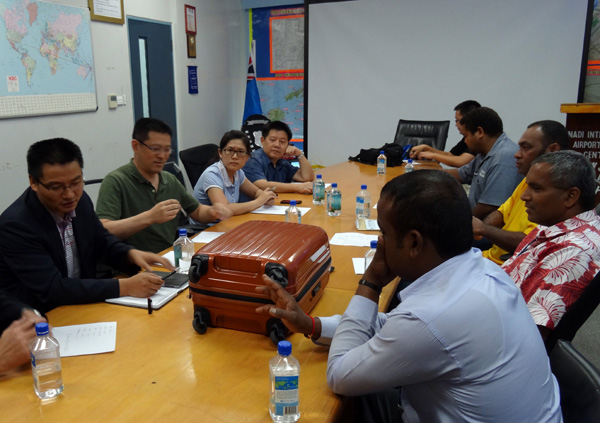 |
|
Chinese police meet officials in an island nation in the South Pacific to discuss transferring economic fugitives. CHINA DAILY |
In recent years, a large number of economic fugitives have escaped overseas, transferring huge amounts of illegal assets, and attracting widespread public and media attention, both at home and abroad.
|
INCREASED COOPERATION IS KEY China and Canada will sign an agreement concerning sharing of the illegal assets that Chinese economic fugitives have transferred to Canada, according to the Ministry of Public Security. "The two sides are engaged in ongoing negotiations and the agreement is likely to be reached in the coming months," according to one senior ministry official who declined to be named. "After the bilateral agreement is concluded, it will facilitate the return of the funds the fugitives sent abroad illegally, and resolve the subsequent economic losses, which will help to prevent fugitives' fleeing the law," he said. In a previous interview, Guy Saint-Jacques, the Canadian ambassador to China, said: "The negotiations are at an advanced stage and an agreement will be reached soon. It will provide a legal basis for Canada to share the proceeds of forfeited assets with China, once we identify the transferred illegal money belonging to some criminals and criminal organizations." Canada is one of the main destinations for Chinese fugitives, including a large number of corrupt officials, because there is no extradition treaty between the two countries. Thousands of "economic fugitives" are still at large, and have transferred "billions of yuan" overseas, according to ministry sources. Since 2008, law enforcement cooperation between China and Canada has made huge steps forward, and Canada's judicial authorities are working closely with their Chinese counterparts to apprehend the absconders and repatriate them. Figures provided by the Canadian embassy in China show that between July 2011 and April 2013, the Canadian authorities oversaw the repatriation of more than 590 Chinese nationals. Of those, 53 were repatriated on allegations of involvement in crimes such as drug trafficking, murder, fraud and gambling. The others were mostly accused of offenses related to illegal immigration, according to the statistics. The ministry said it will deepen cooperation with its Canadian equivalent in areas such as intelligence sharing, investigations, arrests and the extradition of fugitives. |
Favored destinations include Canada, the US, Australia, some European and Southeast Asian countries, and newer havens such as Fiji and Uganda.
According to Global Financial Integrity, a nonprofit research and advocacy organization based in the US, $2.83 trillion was transferred illegally between 2005 and 2011.
"The hunt for economic fugitives is related to economic security and people's vital interests," Liu said. "Our main duty is to catch and repatriate the corrupt officials who are on the run, so they can face trial."
In January, the central government decided to intensify efforts to capture corrupt officials who have absconded and recover their illegally transferred funds.
In March, the Supreme People's Procuratorate issued an order to improve the information database on corrupt officials and increase cooperation with the police to target them.
"Apprehending officials who have absconded overseas is essential for fighting graft," Hong Daode, a law professor from the China University of Political Science and Law, said.
In recent years, a number of corrupt officials have sent their spouses and children abroad to study and invest in businesses. They then transferred funds to foreign bank accounts before applying for tourist visas for themselves and taking the opportunity to slip away, he said.
Since 2012, when China's new leadership took office, the central government and judiciary have "tightened the supervision of 'naked officials', stymied their chances of promotion, and improved efforts to prevent such cases occurring", Hong said.
Liu Jinguo, vice minister of public security, said the ministry set up special teams for "Fox Hunt 2014", to collect intelligence, conduct case-by-case studies, and draw up plans for arrest.
"For each individual case, we establish a case file and assign responsibility for it to a special police unit," he said.
Expanding cooperation
Meanwhile, attention is being paid to expanding channels of international judicial cooperation to improve efficiency in a number of areas, including intelligence, shared investigations, the recovery of funds and joint operations, he said.
Efforts are also being made to persuade fugitives to return home and confess their crimes. Members of the public will be rewarded if they provide relevant information, he added.
According to Liu Dong, in addition to more than 30 fugitives who have been persuaded to return to China, a further 40 have been in contact with the police to discuss returning and confessing their crimes.
"Surrendering is the best choice. We hope more suspects will return soon, and any punishments will be lenient, according to the law," he said.
"When initiating the capture procedures overseas, the priority is to obtain solid evidence and relevant intelligence," Liu Dong said. "Police officers should be good at sifting valuable clues from small details."
'Caught' by a cat
In May, Lei Ming, from the ministry's Economic Crimes Investigation Bureau, successfully apprehended a fugitive who was accused of economic fraud and had fled to Thailand. His breakthrough came via a cat in a photograph.
Lei knew the suspect was hiding in Thailand, but was unable to locate the place where he was staying.
He read through the relevant files several times, but found little of value until he carefully inspected a photo of the suspect in which a cat was sitting on a windowsill, gazing at the scene outside.
When he followed the cat's gaze, Lei saw streetlights, a manhole cover and a pedestrian crossing and remembered seeing exactly the same scene when he had visited a suspected location. Armed with this information, Lei quickly located the suspect's home and was able to apprehend him with the help of the local police.
